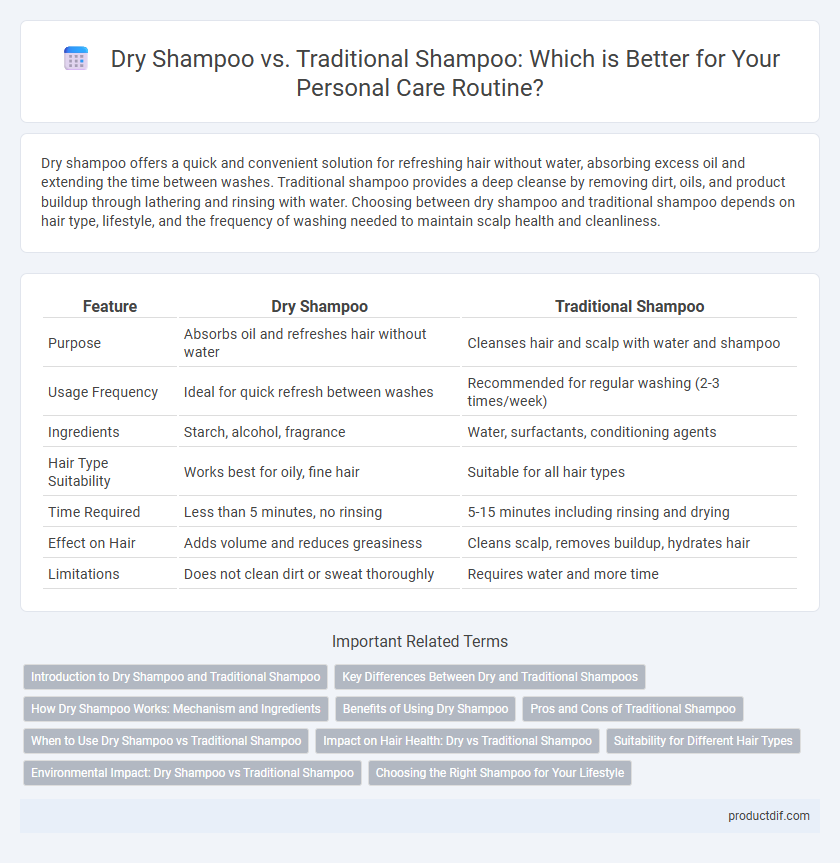Dry shampoo offers a quick and convenient solution for refreshing hair without water, absorbing excess oil and extending the time between washes. Traditional shampoo provides a deep cleanse by removing dirt, oils, and product buildup through lathering and rinsing with water. Choosing between dry shampoo and traditional shampoo depends on hair type, lifestyle, and the frequency of washing needed to maintain scalp health and cleanliness.
Table of Comparison
| Feature | Dry Shampoo | Traditional Shampoo |
|---|---|---|
| Purpose | Absorbs oil and refreshes hair without water | Cleanses hair and scalp with water and shampoo |
| Usage Frequency | Ideal for quick refresh between washes | Recommended for regular washing (2-3 times/week) |
| Ingredients | Starch, alcohol, fragrance | Water, surfactants, conditioning agents |
| Hair Type Suitability | Works best for oily, fine hair | Suitable for all hair types |
| Time Required | Less than 5 minutes, no rinsing | 5-15 minutes including rinsing and drying |
| Effect on Hair | Adds volume and reduces greasiness | Cleans scalp, removes buildup, hydrates hair |
| Limitations | Does not clean dirt or sweat thoroughly | Requires water and more time |
Introduction to Dry Shampoo and Traditional Shampoo
Dry shampoo is a water-free alternative designed to absorb excess oil and refresh hair between washes, making it ideal for quick touch-ups and prolonged hairstyles. Traditional shampoo uses water and cleansing agents to remove dirt, oil, and buildup by thoroughly washing the scalp and hair strands. Both products target hair cleanliness, but dry shampoo emphasizes convenience and time-saving, while traditional shampoo focuses on deep cleansing and scalp care.
Key Differences Between Dry and Traditional Shampoos
Dry shampoo offers a waterless solution that absorbs excess oil and refreshes hair instantly, making it ideal for quick touch-ups and extending time between washes. Traditional shampoo relies on water and cleansing agents to thoroughly clean the scalp and hair, removing dirt, sweat, and product buildup. While dry shampoo prioritizes convenience and volume, traditional shampoo provides a deeper cleanse and scalp nourishment.
How Dry Shampoo Works: Mechanism and Ingredients
Dry shampoo works by absorbing excess oil and moisture from the scalp using key ingredients such as starches, silica, and sometimes clay, which help in reducing greasiness without the need for water. These powders cling to the hair shafts, lifting and refreshing strands instantly while adding volume and texture. Unlike traditional shampoo that relies on surfactants and water to cleanse and remove dirt and sebum, dry shampoo provides a quick, no-rinse alternative for extending the time between washes.
Benefits of Using Dry Shampoo
Dry shampoo offers the benefit of extending the time between traditional washes, reducing scalp irritation and dryness often caused by frequent shampooing. Its quick-absorbing formula efficiently soaks up excess oil and sweat, leaving hair refreshed and voluminous without water. This convenient alternative supports hair health by minimizing exposure to harsh chemicals and heat from blow-drying and styling tools.
Pros and Cons of Traditional Shampoo
Traditional shampoo effectively removes dirt, oil, and buildup from hair and scalp, promoting cleanliness and scalp health with regular use. However, frequent washing with traditional shampoo may strip natural oils, causing dryness and potential scalp irritation, especially for sensitive skin. The rinsing process also requires water, making it less convenient and less eco-friendly compared to waterless alternatives like dry shampoo.
When to Use Dry Shampoo vs Traditional Shampoo
Dry shampoo is ideal for refreshing hair between washes, absorbing excess oil, and extending the life of a hairstyle without water. Traditional shampoo is necessary for thoroughly cleansing the scalp and hair from dirt, sweat, and product buildup, typically used during regular hair washing routines. Using dry shampoo selectively can reduce the frequency of traditional shampooing, helping maintain natural oils and promoting scalp health.
Impact on Hair Health: Dry vs Traditional Shampoo
Dry shampoo absorbs excess oil and sweat, offering a quick refresh without water but can leave residue that may clog hair follicles and cause buildup if overused. Traditional shampoo provides a thorough cleanse by removing dirt, oil, and product buildup, promoting scalp health and hair growth when used regularly. Frequent use of dry shampoo without periodic washing may lead to scalp irritation and weakened hair strands, whereas traditional shampoo supports long-term hair hygiene and strength.
Suitability for Different Hair Types
Dry shampoo suits oily and fine hair by absorbing excess sebum and adding volume without washing, making it ideal for quick refreshment. Traditional shampoo works best for all hair types, particularly thick, curly, or color-treated hair, by thoroughly cleansing dirt, buildup, and product residue. Choosing between dry and traditional shampoo depends on individual hair texture, scalp condition, and desired cleansing frequency.
Environmental Impact: Dry Shampoo vs Traditional Shampoo
Dry shampoo significantly reduces water usage compared to traditional shampoo, helping conserve this vital resource in everyday hair care routines. Unlike traditional shampoos, dry shampoos often contain aerosol propellants and chemicals that may contribute to air pollution and landfill waste. Choosing eco-friendly dry shampoo variants with biodegradable ingredients and recyclable packaging can minimize environmental harm while offering a sustainable alternative to water-based shampoos.
Choosing the Right Shampoo for Your Lifestyle
Dry shampoo offers a quick solution to absorb excess oil and refresh hair without water, making it ideal for busy lifestyles or outdoor activities. Traditional shampoo provides a deep cleanse by removing dirt, sweat, and buildup, promoting scalp health and long-term hair care. Selecting the right shampoo depends on your hair type, daily routine, and personal preferences to maintain cleanliness and hair vitality effectively.
Dry Shampoo vs Traditional Shampoo Infographic

 productdif.com
productdif.com